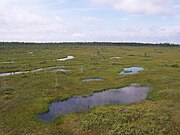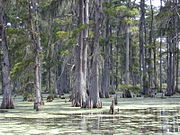A wetland is a land area that is saturated with water, either permanently or seasonally, such that it takes on the characteristics of a distinct ecosystem. The primary factor that distinguishes wetlands from other land forms or water bodies is the characteristic vegetation of aquatic plants, adapted to the unique hydric soil. Wetlands play a number of roles in the environment, principally water purification, flood control, carbon sink and shoreline stability. Wetlands are also considered the most biologically diverse of all ecosystems, serving as home to a wide range of plant and animal life. Wetlands occur naturally on every continent except Antarctica, the largest including the Amazon River basin, the West Siberian Plain, and the Pantanal in South America. The water found in wetlands can be freshwater, brackish, or saltwater. The main wetland types include swamps, marshes, bogs, and fens; and sub-types include mangrove, carr, pocosin, and varzea.
The UN Millennium Ecosystem Assessment determined that environmental degradation is more prominent within wetland systems than any other ecosystem on Earth. International conservation efforts are being used in conjunction with the development of rapid assessment tools to inform people about wetland issues.
Constructed wetlands can be used to treat municipal and industrial wastewater as well as stormwater runoff and they also play a role in water-sensitive urban design.
The word once included the sea or an arm of the sea, in its range of meaning but this marine usage is now obsolete (OED). It is a poetical or dialect word meaning a sheet of standing water, a lake or a pond (OED). The OED's fourth definition ("A marsh, a fen.") includes wetland such as fen amongst usages of the word which is reflected in the lexicographers' recording of it. In a quotation from the year 598, mere is contrasted against moss (bog) and field against fen. The OED quotation from 1609 does not say what a mere is, except that it looks black. In 1629 mere and marsh were becoming interchangeable but in 1876 mere was 'heard, at times, applied to ground permanently under water': in other words, a very shallow lake.
Where land similar to that of Martin Mere, gently undulating glacial till, becomes flooded and develops fen and bog, the remnants of the original mere remain until the whole is filled with peat. This can be delayed where the mere is fed by lime-rich water from chalk or limestone upland and a significant proportion of the outflow from the mere takes the form of evaporation. (Full article...)
- America's Wetland Foundation
- Birds Korea
- Delta Waterfowl Foundation
- Ducks Unlimited
- Foundation for Ecological Security
- Irish Peatland Conservation Council
- National Wetlands Coalition
- Theodore Roosevelt Conservation Partnership
- Union Sportsmen's Alliance
- Wetlands International
- Wildfowl & Wetlands Trust

- Acrotelm
- Aquatic ecosystem
- Aquatic plants
- Atchafalaya Basin
- Backswamp
- Bayou
- Beach meadow
- Blackwater river
- Blanket bog
- Bog
- Bog bodies
- Bog butter
- Bog garden
- Bog iron
- Bog snorkelling
- Bog-wood
- Brackish marsh
- Callows
- Carr (landform)
- Cataract bog
- Cienega
- Coniferous swamp
- Converted wetland
- Dambo
- Drainage basin
- Drought refuge
- Estuary
- Everglades
- Fen
- Fen-meadow
- Flark
- Flooded grasslands and savannas
- Flood-meadow
- Floodplain
- Freshwater swamp forest
- Grass valley
- Guelta
- Halosere
- High Fens
- High marsh
- Hamuns
- Hydric soil
- Hydrology
- Hydrosere
- Igapó
- Ings
- Integrated constructed wetland
- Interdunal wetland
- Intertidal wetland
- Kettle (landform)
- Lagoon
- Lake ecosystem
- Limnology
- List of bogs
- List of fen plants
- Low marsh
- Meadowview Biological Research Station
- Marsh
- Marsh gas
- Mere
- Mire
- Misse
- Moorland
- Muck
- Mudflat
- Muskeg
- Myristica swamp
- Oasis
- Ombrotrophic
- Paludification
- Palustrine wetland
- Pantanal
- Peat
- Peat swamp forest
- Pond
- Pothole
- Prairie Pothole Region
- Ramsar site
- Reed bed
- Restoration of the Everglades
- Riparian zone
- River delta
- River ecosystem
- Salt marsh
- Salt marsh dieback
- Salt marsh die-off
- Salt pannes and pools
- Shrub swamp
- Slough (hydrology)
- Sphagnum
- String bog
- Sudd
- Swale
- Swamp
- Tropical peat
- Várzea forest
- Vernal pool
- Water stagnation
- Wetland classification
- Wetland conservation
- Wetland indicator status
- Wetland methane emissions
- Wetlands International
- Wetlands
- Wildfowl & Wetlands Trust
- Will-o'-the-wisp
- Yaéré
- Create articles: There are many articles that have yet to be started... Pick your favorite and start researching!
- Find photos for articles: Many wetlands–related articles would be substantially better with the addition of one or more photographs. Feel free to take your own and upload them, or find ones with the appropriate licenses and upload them here!
- Categorize articles: Figure out what categories to add to each article so that others can find them more easily.
- Expand articles: There are many wetland stubs which could use extensive updates and development.
- Find sources: Many of our articles are poorly sourced and could use much better citations.
- Wikify: Add {{Portal|Wetlands}} to the See also sections of Wetlands-related articles.
The following Wikimedia Foundation sister projects provide more on this subject:
-
Commons
Free media repository -
Wikibooks
Free textbooks and manuals -
Wikidata
Free knowledge base -
Wikinews
Free-content news -
Wikiquote
Collection of quotations -
Wikisource
Free-content library -
Wikispecies
Directory of species -
Wikiversity
Free learning tools -
Wikivoyage
Free travel guide -
Wiktionary
Dictionary and thesaurus









































































